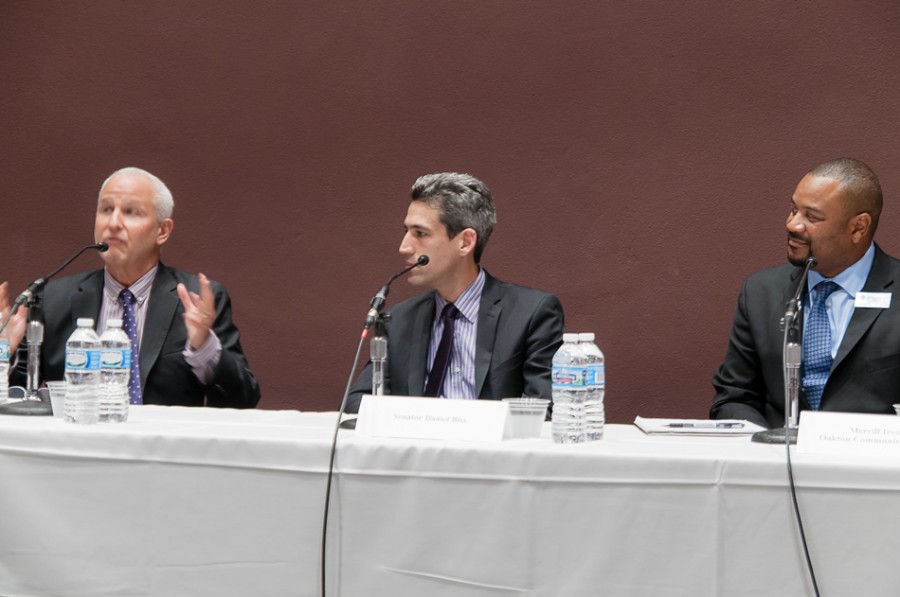State Sen. Biss moderates discussion on higher education affordability
Jeanne Kuang/Daily Senior Staffer
University President Morton Schapiro, State Sen. Daniel Biss (D-Evanston) and Oakton Community College administrator Merrill Irving discuss higher education affordability and access at Northwestern on Monday night. Biss said the discussion benefitted from having administrators from different institutions talk about their methods for helping low-income students.
October 28, 2014
University President Morton Schapiro and Merrill Irving Jr., an administrator at Oakton Community College in Des Plaines, discussed Monday night ways to make higher education more accessible for low-income students.
The discussion, attended by about 20 people at Rebecca Crown Center, was moderated by State Sen. Daniel Biss (D-Evanston) as part of his office’s conversation series about issues relevant to his district.
Schapiro touted the University’s efforts to reach out to more Evanston and Chicago high school students but emphasized elite private universities must do more to support low-income students and have more socioeconomically diverse student bodies.
“The Northwesterns of the world have to do a better job being part of the solution,” he said.
Schapiro spoke about his Good Neighbor, Great University initiative, which gives Chicago Public Schools and Evanston Township High School graduates “specially augmented” financial aid packages at NU, and his goal to have each freshman class include 100 CPS graduates and more than 20 ETHS graduates, and to increase enrollment of Pell Grant recipients.
He also touched on the Northwestern Academy for Chicago Public Schools, a program for low-income CPS students who do not attend a selective high school to prepare them for a competitive college. Schapiro said the money spent on the Northwestern Academy is “the best money we spend.”
Irving, Oakton’s associate vice president of continuing education, training and workforce development, stressed the importance of college guidance for high school students in addition to affordability.
“It’s not just the costs, it’s about knowing what to do and having the right people to lead you,” he said.
He also spoke about his research on the experience of black students in predominantly white higher education institutions, explaining black students in historically black colleges tended to have stronger leadership skills while black students in predominantly white institutions tended to have stronger “resource and scavenger skills.”
Predominantly white universities “are not prepared to acclimate those students from a different environment,” Irving said.
Schapiro argued similarly about services for low-income and first-generation students at elite universities.
“The philosophy has been that if you’re good enough to get in, you’re good enough to survive,” he said. “I think that is a terrible philosophy … Our responsibility just begins when they enter the door.”
He said elite universities have been “complicit” in having environments that are less welcoming to lower income students.
“We haven’t been thoughtful enough to provide the same kind of experience regardless of family background,” Schapiro said.
After the event, Biss said the discussion benefited from having administrators from both NU and Oakton, which he said have “similar cultural and educational values” despite being “two different sets of expertise.”
“The institutions are really different, but they concern the same pools of students,” he said. “They’re in it to help the same pool of kids.”
Email: [email protected]
Twitter: @jeannekuang












